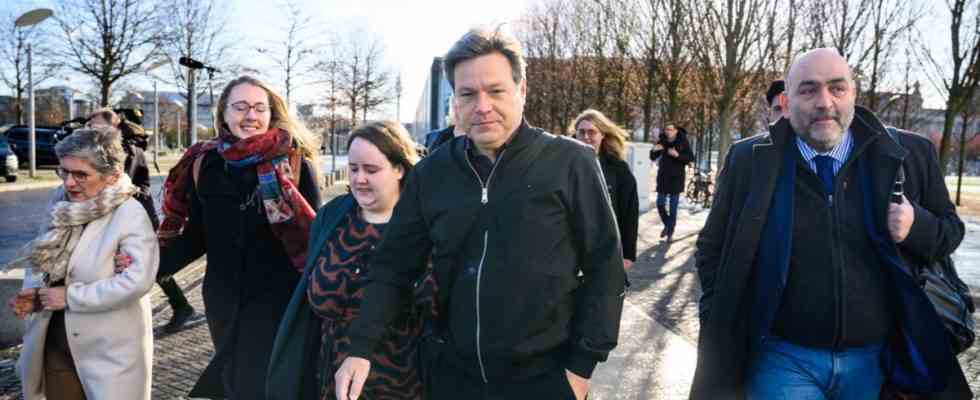The basic dispute in the traffic light coalition about the pace and the burden on citizens when it comes to climate protection triggers increasing frustration among the Greens with Chancellor Olaf Scholz (SPD). “The traffic light could also govern better than it does,” said Baden-Württemberg Prime Minister Winfried Kretschmann. “I think holding 19-hour meetings is a sign of the Chancellor’s weakness in leadership.” On Monday, the coalition committee, which had already met on Sunday evening, was interrupted after a good 19 hours.
On Tuesday, Scholz continued to negotiate for hours with the leaders of the SPD, Greens and FDP, important dates were again postponed or canceled. Union faction leader Friedrich Merz (CDU) emphasized in Berlin: “We obviously have a government crisis in Germany.” The federal government can no longer agree on essential issues. “She has been constantly arguing in public for the past few days and weeks.” Chancellor Scholz “at times stood on the sidelines like an uninvolved person and acted as if he had nothing to do with the whole thing,” said Merz. In view of the endless negotiations and conflicts, he “can hardly imagine that there is still a sufficiently secure basis for the continued existence of this coalition”.
The more than 25 hours of negotiations on controversial issues such as accelerated motorway expansion, more CO₂ savings in the transport sector and the de facto ban on new gas and oil heating systems desired by the Greens from 2024 are a record for the traffic light coalition. The question of how strict government regulations should be when it comes to climate protection has been an area of conflict for the coalition for months, and the planned climate protection law is stuck. The Greens are opposed to the idea of softening the CO₂ targets of individual sectors. In her opinion, traffic in particular, for which FDP Minister Volker Wissing is responsible in the government, falls far short of the necessary savings.
The question of the future is increasingly developing into a predetermined breaking point for the coalition
The FDP insists that fewer bans are used and instead insists on openness to technology; it therefore wants to keep a back door open for combustion engines with climate-friendly fuels (e-fuels). The SPD, in turn, warns against overburdening the citizens. The heating dispute has led to a lot of uncertainty, climate protection measures must be more socially cushioned. In addition, the FDP and SPD fear job losses, especially in industry, if electricity becomes too expensive and climate-friendly conversion becomes a locational disadvantage. The Greens were increasingly annoyed that conflicts between the two partners kept coming up.
This question of the future is increasingly developing into a predetermined breaking point for the coalition. It fits the picture that the chancellor actually wanted to work on the major progress on Tuesday, but then had to devote himself to tough text work again after little sleep. A summit of the “Alliance for Transformation” was originally on the agenda in the Chancellery, with seven federal ministers, representatives from business, trade unions, science and energy experts. But it was cancelled. Instead, the Greens walked towards the Chancellery again, while the FDP squad headed by Finance Minister Christian Lindner was driven up in limousines. Green leader Omid Nouripour spread purposeful optimism: “Successful and good” it will be.
Foreign Minister Annalena Baerbock (Greens) admitted tough debates. More renewable energy instead of oil, coal and gas is a question of national interest and security, she said before the new coalition meeting at the start of a conference on the energy transition. Because of the war in Ukraine, Germany has shed its fossil dependencies on Russia. The heaters are now also a “safety issue”.
Such text work always takes longer than planned, the negotiating teams said
Another delay on Tuesday morning made it clear how great the need for clarification was after the negotiations that began on Sunday. In the Chancellery, things didn’t start on time again: instead of 9 a.m., the negotiators arrived at the Chancellery at 10:15 a.m. The FDP had previously announced the need for internal talks.
As on Monday, the schedule was tight. By 3 p.m. at the latest, the participating faction leaders wanted to go to the Reichstag to take part in their faction meetings. But as work on the almost 20-page template picked up speed, the next detailed problems emerged. Such text work always takes longer than planned, the negotiating teams said. However, Federal Transport Minister Wissing had long since called off an evening appointment. The parliamentary group leaders canceled their statements, and in the SPD parliamentary group meeting, parliamentary group leader Rolf Mützenich had to be represented by Deputy Achim Post. In the afternoon the Chancellor had to receive Kenya’s President William S. Ruto, which led to a further interruption of the controversial deliberations.
At the subsequent press conference with Kenyan President Ruto in the early evening, Chancellor Scholz said he was very happy about these talks and that good progress was being made. He countered criticism from the opposition, but also from the ranks of the coalition in the preparation of the coalition committee. The “very, very intensive preparatory work” that he did with Vice Chancellor Robert Habeck (Greens) and Finance Minister Christian Lindner (FDP) is paying off. The talks would produce good results and also cover areas that would not have figured in the public debate. The goal is the modernization of the country, and it is “important that we do everything right” if this is to take place with the “necessary speed” that is required for Germany as the fourth largest economy. But what he did not say: when the work on the third day of the coalition committee should actually be finished.

